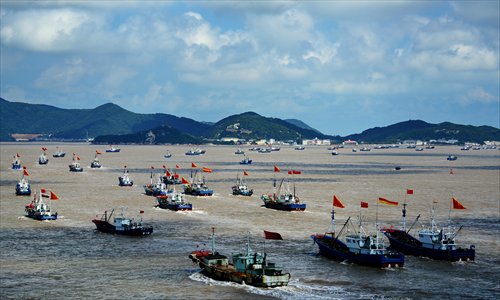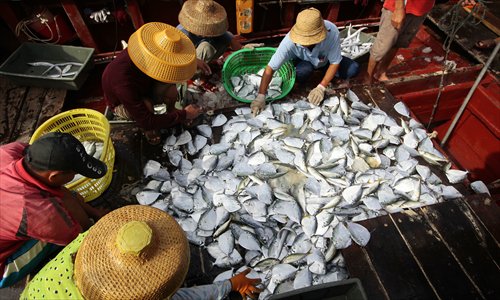Facing strictest-ever fishing ban, fishermen head – sometimes illegally – to foreign waters
As the fishing resources of China's coastal regions are shrinking, many Chinese fishermen are having to look further afield for the catch of the day. Some have even resorted to illegally fishing in other countries' waters, which can cause political tensions to spike. To combat this issue, the government has tried to educate Chinese fishermen about the law and to restore the country's own resources.

A fleet of over a thousand fishing boats heads toward the East China Sea as the fishing season begins in Zhoushan, Zhejiang Province on September 16, 2015. Photo: CFP
In the Yellow Sea between China and the Korean Peninsula, dozens of massive ships sit idle in the harbors of Shidao, East China's Shandong Province. Two months ago, these fishing vessels were operating at full speed to catch fish, but between June and September they are banned from fishing.
While the sea is peaceful, the air above Shidao's harbors is heavy with unspoken tensions. Some of the city's major harbors even forbid public visits and just taking a few snaps with one's cellphone arouses the attention of the seafarers.
"This year's fishing ban is the strictest we've experienced. The fishermen's guards are up. They were worrying that you were taking photos that could bring them trouble," Li Xing (pseudonym), a ship owner at the biggest Shidao harbor, told the Global Times.
If anyone is caught illegally fishing during this period, they will face a heavy fine and even criminal charges.
As the fish population off China's coast depletes, the annual fishing ban is one of several measures the country is taking to better protect stocks.
But as the fishermen find it ever more difficult to make a living by fishing in Chinese waters, some are risking fishing illegally in foreign waters.
"It's too hard to fish in our own waters where the fish are limited. So sometimes we have to catch fish illegally in other countries' waters," said Li while his gold necklace glinted in the sun.
Illegally fishing abroad
Shidao is the part of the Chinese mainland closest to South Korea. Many locals like Li make their living through fishing.
Dark-skinned and stout, Li said that despite official attempts to stamp out illegal fishing, he has "stolen" fish from other countries, including South Korea.
"We are so close to South Korea. It takes us less a day to go fishing there. In their waters, we can get our ship fully loaded in just a few hours. And we can get more than 1 million yuan ($150,000) for a full ship of fish," he said.
A study by the Tianjin Bohai Sea Marine Products Institute in 2012 showed that the Bohai Sea - the Yellow Sea gulf on which Shidao sits - has seen its stock of commercial fish drop from over 70 varieties in the past to just 10.
"We have upgraded our fishing nets step by step. There are many fishing nets which can catch even the very tiny shrimp and fish. Though it (using small-holed nets) is illegal, we still do it, catching fish from tiny to big," said Li, adding that this is the main cause of the depletion of fishing resources.
But this illegal cross-border fishing has attracted the attention of both the Chinese and South Korean governments. To avoid the authorities, according to Li, they go to sea at dark and conceal the registration numbers inscribed on their ships. Often around a dozen ships sail out to fish together.
"If we get caught by the South Korean coastguard, we pay a 1.4 million yuan fine for each ship," he said.
According to Li, if one ship gets caught by the coastguard, the boat owners who go fishing together will chip in to pay the fine.
In addition to these fines, fishermen caught fishing illegally can face losing their fishing licenses upon their return to China or even violence from coastguards.
In 2014, a Chinese fisherman was shot dead by the South Korean coastguard, who said that the man was fishing illegally.
When asked if he worries about his safety, Li responded that fishing is not a serious business. "Smuggling drugs is deadly but there are still people who dare to do it. I just steal some fish."
According to a July report from the South Korean Yonhap News Agency, the South Korean government will spend 8 billion won ($7 million) installing about 80 new reefs to prevent illegal fishing.
Besides South Korean waters, Li revealed that a section of North Korea's waters is called "no man's land" and is ruled by pirates from Dandong, Northeast China's Liaoning Province, and North Korea.
"We pay the pirates about 600,000 yuan per ship to fish in this specific area for a limited period of time," he said, adding that even if the payment is high, it's still worth it.
After they finish fishing in other countries, Li said they pay cargo ships to transport their catch back to China through other countries like Russia. These fish will then be counted as an imported commodity, giving them a legal identity.
"The Chinese government encourages us to fish in the South China Sea. But I don't dare to go there. That place is much more dangerous due to the exchanges of gunfire [between different countries]," Li said. There are several ongoing territorial disputes in the region.
In June, Chinese fishing boats were harassed and shot at by Indonesian naval vessels in the South China Sea.
The Vietnamese state-owned Thanh Nien Daily released a set of photographs which they claimed showed Chinese patrol boats driving Vietnamese fishing vessels away from Huayang Reef, one of the Nansha Islands in the South China Sea on May 30.

Sue for dignity
Unlike lawbreaker Li, Yan Keqing, 44, a fisherman in East China's Zhejiang Province has fished in South Korean waters with a legal license.
In 2001, China and South Korea signed the Sino-South Korea Fishery Agreement. Under this agreement, Chinese ships can obtain a permit to operate in defined South Korean maritime regions.
But the number of licenses is limited and the ships have to follow strict regulations set by South Korea. Only about 2,000 ships can get licenses each year. According to fishfirst.cn, by the end of 2014, China had about 1.06 million fishing vessels
China also has similar fishing agreements with other countries, signing one with Japan in 1997 and establishing another with Vietnam back in 2000.
Yan obtained a license to fish in South Korea, but an incident in 2012 changed this.
One of his fishing boats was chased by South Korean coastguards who claimed Yan's boat was fishing illegally. Some 13 of Yan's crew members were injured and three were beaten unconscious.
Yan rushed to South Korea to see his crew members, who at the time were still receiving emergency care, and cried when he saw the brutal treatment they had received.
Later he was asked by the South Korean authorities to pay all his crew's medical expenses. "They not only beat us, but also asked us to pay the treatment fees. This goes too far in bullying others and I can't take it," Yan told the Global Times.
He then made the decision to sue the coastguard in a South Korean court, which he said is "for dignity."
"I knew I would lose the battle. It's too hard for a man to fight in another country's land. But I want the whole world to see how the South Korean coastguard treated Chinese fishermen," he said.
After losing the lawsuit in 2014, Yan sold his two fishing vessels to cover his costs.
"It's so hard to catch fish in our waters these days. And now I'm unwilling to go to other countries to fish. So I've hung up my nets," he said.
"I miss the golden days of fishing. When I was a boy and went fishing with my father, we didn't need to sail far to get enough fish. I hope one day we can return to that time," he told the Global Times.

Fishermen pick fish from their net after their first fishing trip of the season in the South China Sea in Sanya, Hainan Province on August 2, 2015. Photo: CFP
Road to past glory
Li Shuai, an official with the Weihai border protection troops in Shandong, the force that is tasked with managing the fishermen, told the Global Times that they have tried to stop illegal fishing.
According to Li Shuai, this year they have reexamined all their data about the city's harbors, vessels, fishermen and their fishing licenses. They are also collaborating with coastguards in other regions like Qingdao in Shandong.
"Less and less fishermen are going overseas to fish illegally," he claimed.
The government hasn't made public data about how many fishermen fish illegally.
Their team has paid regular visits to harbors to educate ship owners and crew members about this issue. They have also developed an online test about what fishermen are and aren't allowed to do, which every fishing vessel captain and crew member has to pass before they are allowed to work.
"If they fail the exam, they won't be granted a fishing license. Besides, we require ship owners and captains to sign a responsibility letter before sailing," he said.
Other coastal provinces are also taking measures to protect fishing resources.
According to the website of the Zhejiang Province Ocean and Fisheries Bureau, they have strengthened their surveillance of fishing vessels during the period when fishing is banned. Other provinces like Hainan are also reportedly taking measures such as encouraging the cultivation of commercially viable plants and animals in the sea to help revive fishing resources.
Both Li Xing and Yan admitted that these measures are helpful. Yan added that China should learn from South Korea and extend its annual fishing ban to six months so that the fish can have more time to grow and breed.
As China subsidizes fishermen, Yan said it won't be a problem if they rest for about half a year. "If the hauls are good, we can make enough money for the year while we are working," he said.
Sun Quanhui, a senior scientific advisor at international NGO World Animal Protection, told the Global Times that high-intensity fishing - including the illegal use of small-holed nets - depletes fish stocks and should be outlawed.
"The fishery resources cannot recover. Besides, industrial pollution and marine litter hurt the sea. And climate change worsens the whole situation," he said. "It's important to know first which factors harm fisheries most to develop better tactics."
While he is for programs that encourage fish to breed, Sun warned that "it needs to be planned scientifically, to determine what kinds of marine animals should be bred and where they should be cultivated. Otherwise, it could have a long-term bad effect on ocean ecology."
Newspaper headline: Making waves abroad